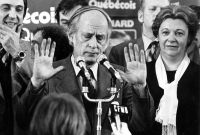Support strong Canadian climate journalism for 2025
The death of former Quebec premier Bernard Landry Tuesday prompted a stream of accolades from his former colleagues about his patriotism, his love of the Quebec people and his conviction that the province would inevitably become a country.
But his passing also highlighted the fact that the pioneering generation of Quebec sovereigntists — those who were in the trenches when the Parti Quebecois was born — is dying without seeing its dream realized.
And there are no obvious candidates to fill the role of such departed PQ greats as former premier Jacques Parizeau, who died in 2015, Lise Payette, who died Sept. 5, and Landry.
"For right now, it's clear that there is the impression that the ranks are thinning," Louise Harel, a longtime friend of Landry who replaced him as interim PQ leader following his 2005 resignation, said Wednesday.
Harel, 72, was among the many friends and former political allies who recently paid a final visit to Landry at his home in Vercheres, Que. as his health was slipping.
Harel said in an interview that Landry, who was 81, remained optimistic about Quebec becoming a country. "For him, it was a project that was non-negotiable," she said. "It was the project of his life."
Parizeau, in his later years, expressed frustration that the sovereignty movement had stalled and faced, in his words, a "field of ruin."
His comments came after the PQ government of Pauline Marois, pushing a charter of values that sought to prevent public-sector workers from wearing conspicuous religious symbols, was defeated in 2014. The charter stung the PQ, particularly among the younger generation, many of whom turned to the other sovereigntist party, Quebec solidaire.
Landry, on the other hand, remained unswervingly optimistic about the movement's future, even if he wasn't shy about criticizing PQ leaders over policy.
When several high-profile PQ members of the legislature quit the party before the 2018 election, he refused to see it as a harbinger of the movement's demise. People come and go, but the party's ideas "remained unscathed," he told The Canadian Press.
"Now, there are winnable ridings for young men and women who want to replace the ones leaving," he said.
In fact, in the Oct. 1 election, the PQ dropped to just 10 seats from the 28 it held before the vote.
Monique Simard, a PQ member of the legislature from 1996 to 1998, produced a documentary about Landry's 2003 election campaign as leader and incumbent premier.
Simard, 68, said the former premier gave her full access to his campaign. Her crew was filming when he learned he had lost to Jean Charest's Liberals, a defeat that would set in motion his eventual resignation as party leader in 2005.
"We were right there. We saw all the emotion, all the sadness," she said. "But within a few minutes, he was very cordial and he called Charest to concede. He was someone who was very solid and strong at the same time."
Despite two failed independence referendums in 1980 and 1995 and his 2003 electoral defeat, "he never wavered," said Simard, who spoke to Landry on the phone last Friday.
"His flame for the cause of his life never diminished."
That cannot be said for all the former sovereigntists who are now part of Premier Francois Legault's Coalition Avenir Quebec team. Legault, a former PQ cabinet minister, has himself turned his back on the sovereignty movement.
His administration, according to a report by Radio-Canada, includes 12 chiefs of staff out of 26 with strong ties to the PQ.
Harel agreed with Simard that nothing could have made Landry change his mind.
"For him, it was an absolute certitude," she said. "His optimism wasn't an optimism about the PQ, it was an optimism about sovereignty. He was absolutely convinced, that for a people to attain its dignity, their existence cannot be refused."
Landry will receive a state funeral next Tuesday at 2 p.m. at Montreal's Notre-Dame Basilica, the government announced Wednesday.





Comments